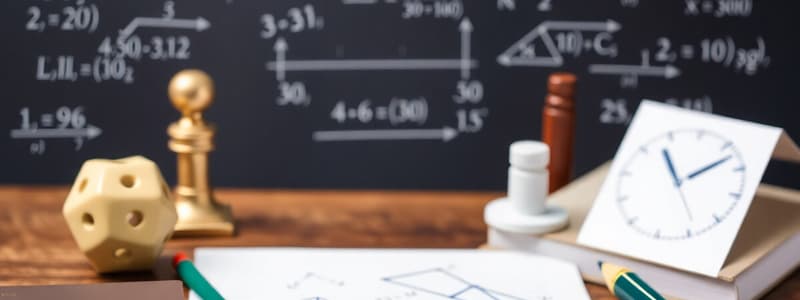Podcast
Questions and Answers
What is a key component of the assessments in diploma programs?
What is a key component of the assessments in diploma programs?
- Only written exams are used
- Practical exercises and problem-solving are included (correct)
- Assessments are not necessary for understanding concepts
- Assessments focus solely on memorization
Which of the following represents a potential career path for graduates with a diploma in mathematics?
Which of the following represents a potential career path for graduates with a diploma in mathematics?
- Entry-level jobs in engineering or finance (correct)
- Only teaching positions in primary schools
- Specialization in literature analysis
- Exclusive focus on artistic professions
What is emphasized in the diploma program's curriculum?
What is emphasized in the diploma program's curriculum?
- Only theoretical knowledge without application
- Learning facts by rote without contextual understanding
- Understanding the theory along with its practical applications (correct)
- Focus solely on practical skills without theoretical foundation
How do course modules in the diploma program typically progress?
How do course modules in the diploma program typically progress?
What roles might a diploma in mathematics prepare students for?
What roles might a diploma in mathematics prepare students for?
What is typically included in a diploma in mathematics curriculum?
What is typically included in a diploma in mathematics curriculum?
Which mathematical area focuses on limits, derivatives, and integrals?
Which mathematical area focuses on limits, derivatives, and integrals?
What skill is emphasized in the diploma mathematics program for tackling challenges?
What skill is emphasized in the diploma mathematics program for tackling challenges?
Which branch of mathematics involves analyzing data and making informed decisions?
Which branch of mathematics involves analyzing data and making informed decisions?
Which concept ensures the manipulation of geometric figures and theorem proving?
Which concept ensures the manipulation of geometric figures and theorem proving?
What type of equations does the algebra curriculum cover?
What type of equations does the algebra curriculum cover?
What mathematical field is essential for solving problems in both geometry and calculus?
What mathematical field is essential for solving problems in both geometry and calculus?
Which area might students explore depending on the specific curriculum of the diploma?
Which area might students explore depending on the specific curriculum of the diploma?
Flashcards
Diploma Assessment Structure
Diploma Assessment Structure
Assessments include assignments, exams, and projects, building on prior knowledge.
Role of Practical Exercises
Role of Practical Exercises
Practical exercises and problem-solving are essential for applying theoretical knowledge.
Career Paths for Graduates
Career Paths for Graduates
Graduates pursue entry-level roles in fields like engineering, finance, and research.
Further Education Opportunities
Further Education Opportunities
Signup and view all the flashcards
Specialization Careers
Specialization Careers
Signup and view all the flashcards
Diploma in Mathematics
Diploma in Mathematics
Signup and view all the flashcards
Core Areas of Study
Core Areas of Study
Signup and view all the flashcards
Algebra
Algebra
Signup and view all the flashcards
Calculus
Calculus
Signup and view all the flashcards
Statistics
Statistics
Signup and view all the flashcards
Trigonometry
Trigonometry
Signup and view all the flashcards
Mathematical Modeling
Mathematical Modeling
Signup and view all the flashcards
Analytical Problem-Solving
Analytical Problem-Solving
Signup and view all the flashcards
Study Notes
Diploma Mathematics Overview
- A diploma in mathematics is a post-secondary qualification, typically lasting one to two years, providing a comprehensive understanding of mathematical concepts and their applications.
- The curriculum blends theory and practice, covering algebra, calculus, geometry, and statistics.
- Students explore topics like differential equations, linear algebra, or discrete mathematics depending on the specific program.
- It serves as a stepping stone for further studies in mathematics or related fields like engineering, physics, or computer science.
- Graduates gain strong problem-solving skills, analytical abilities, and a solid mathematical foundation.
Core Mathematical Concepts in a Diploma
- Algebra: Covers linear equations, quadratic equations, polynomials, systems of equations, and inequalities. Includes algebraic expression manipulation and equation solving.
- Calculus: Focuses on limits, derivatives, and integrals of functions, applying these to optimization problems, curve sketching, and real-world modeling.
- Geometry: Includes Euclidean, coordinate, and sometimes vector geometry, emphasizing geometric figure manipulation and theorem proving.
- Statistics: Covers descriptive statistics (measures of central tendency and variability), inferential statistics (hypothesis testing and probability).
- Trigonometry: Covers trigonometric functions, identities, and their applications in geometry and calculus.
Applications of Mathematical Knowledge
- Modeling Real-World Phenomena: Used to model and analyze real-world situations in physics, engineering, economics, and finance.
- Problem Solving: Emphasizes strong analytical and problem-solving skills using mathematical techniques.
- Data Analysis: Develops essential tools for data analysis, drawing conclusions, and making informed decisions, especially in statistical applications.
- Critical Thinking: The mathematical rigor fosters critical thinking and logical reasoning.
Diploma Structure and Assessment
- Modules build upon previous knowledge, progressively introducing complex concepts.
- Assessments include assignments, exams, and projects, with varying types and frequencies depending on the specific program.
- Practical exercises and problem-solving are central to the program.
- Understanding both theory and its applications is emphasized.
Possible Career Paths
- Graduates can pursue entry-level positions in engineering, finance, or research.
- A diploma prepares students for further study in bachelor's or master's programs in related fields.
- It's beneficial for roles requiring strong analytical and problem-solving abilities.
- Specializations allow for careers in data science, actuarial science, or operations research.
Studying That Suits You
Use AI to generate personalized quizzes and flashcards to suit your learning preferences.




